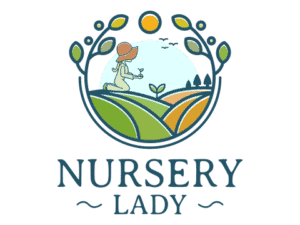Hens and Chicks are unique and low-maintenance succulents that survive even in negligence. They don’t even need many nutrients. Now, a common question that arises is whether Hens and Chicks need fertilizer or not.
As a general rule, Hens and Chicks do not need any fertilizer if they are grown outdoor in soil beds. But, if you want them to grow in a pot or container, then fertilizing them with a balanced fertilizer will help. Also, fertilizing them will help the plant grow quicker and spread more.
In this article, I have mentioned the details related to the fertilization of the Hens and Chicks. I will also cover the best time to fertilize, the best fertilizer, and the results of over-fertilization.
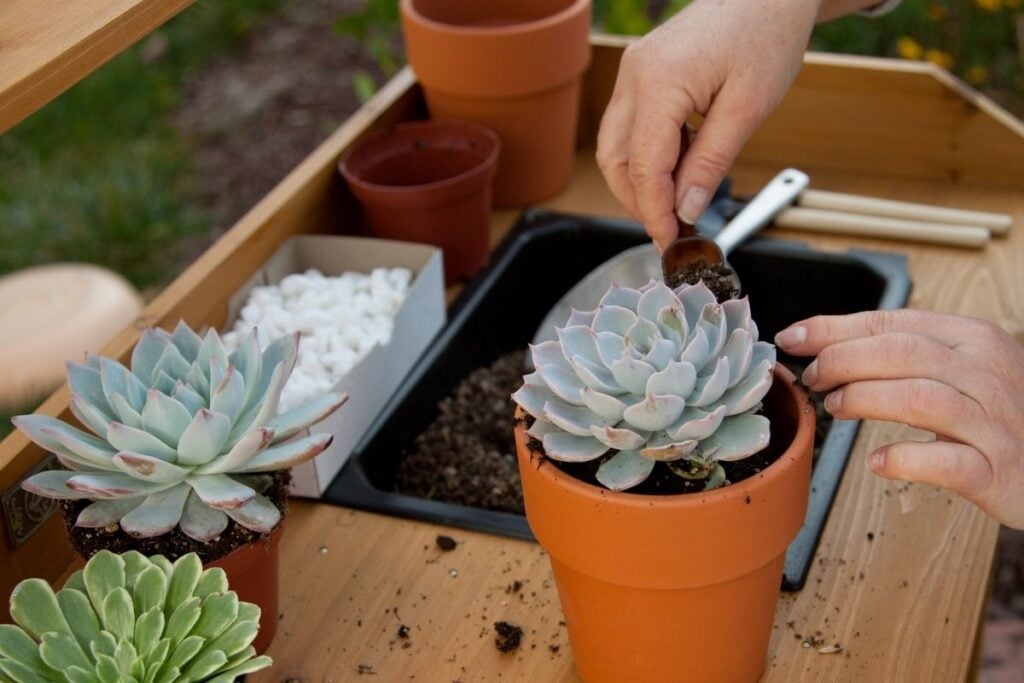
Should I fertilize Hens and Chicks?
Generally, Hens and Chicks will not need much fertilizer for being healthy. These plants will remain healthy and thrive when planted in infertile soil and neglected.
Hens and Chicks release chemicals named auxins in huge quantities. This chemical helps the plant to facilitate its growth.
In their natural habitat, Hens and Chicks grow on large rocks and stones with minimal soil. They need the soil only for root development.
These plants will not thrive in nutrient-rich ground. They will become long and leggy, and the roots rot. Altogether your plant will be doomed to death.
Despite these reasons, you can fertilize Hens and Chicks if you want. Fertilizing them will help the plant to grow at a faster rate. These extra nutrients will also help them to multiply more and flower profusely.
Make sure not to over-fertilize your Hens and Chicks. It will give rise to severe issues, and it will be tough to resurrect the plant.
Using less amount of fertilizer or no fertilizer at all will not cause any damage to your plant. If you don’t know the right way or time to fertilize Hens and Chicks, do not fertilize.
Fertilizer only speeds up the plant’s growth rate. But over-fertilizing can slow down the growth more than usual. So think twice and be careful while fertilizing.
What is the best time to fertilize Hens and Chicks?
Fertilizing the Hens and Chicks will enable the plant to multiply, spread and flower. You don’t need to fertilize them the whole year. When they are growing actively, that is when you should fertilize them.
As they thrive, they will quickly take up the food without provoking any injury to the plant. These extra nutrients save them from suffering from any nutrient deficiency.
If you want, you can avoid fertilizing altogether. Only do it when you find them struggling from any extreme deficiency of any particular nutrient. You can avoid fertilizing the plants that are growing in gravel or stones.
Fertilize when the plant grows in a bed of garden soil and sandy soil. A small amount of fertilizer will foster good health.
The best time to fertilize Hens and Chicks is during the spring. During this season, they are vigorously developing. Fertilizing will support in fast and more significant growth of the plants.
Fertilize The Hens and chicks once a month with a water-soluble fertilizer. This will also keep the color of the plant prominent. The rosette will look bigger and attractive to the eyes.
Not only just fast growth, fertilizing can help in more spreading. Fertilizing will let the plants multiply into more daughters when they are active. If you want more of Hens and Chicks, you can use these offsets to plant and have more of them.
Fertilizing in summers
Though the best time is spring, you can also fertilize little during the summers.
Just like the spring, you can fertilize them once a month with a water-soluble fertilizer in summers. These plants tend to flower in the summer season. Fertilizing will make the plant bloom abundantly with bright colors.
Some growers will even recommend fertilizing once a year only during spring. This is not at all wrong. However, it depends on the plant’s growing condition. You can even do this if you are unsure about fertilizing. At least they will grow faster.
Fertilizing in winters
These plants slow down their growth when autumn arrives. In the fall, the temperature starts dropping, and the weather gets cold. The plant will stop growing slowly, and it will go completely dormant in winters.
When dormant, these plants are in hibernation. So they will neither need any water nor take up any extra nutrients. Fertilizing in the winters will only pollute the soil and make the plant suffer from over-fertilization.
Stop fertilizing when the temperature begins to drop downwards.
Looking for gardening supplies? We have tested 100's of products before recommending them to you guys. Check out our best pick below:
| Image | Gardening Supplies | Best Price? |
|---|---|---|
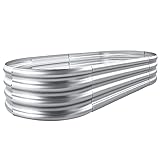 Top
Top Top
Top | Raised Garden Bed Kit | Check On Amazon |
 | XLUX Soil Moisture Meter, Plant Water Monitor, Soil Hygrometer Sensor for Gardening, Farming, Indoor and Outdoor Plants, No Batteries Required | No Results |
 Top
Top Top
Top | 82 Pcs Garden Tools Set and Extra Succulent Tools Set | Check On Amazon |
 | Joeys Garden Expandable Garden Hose with 8 Function Hose Nozzle, Lightweight Anti-Kink Flexible Garden Hoses, Extra Strength Fabric with Double Latex Core, (50 FT, Black) | No Results |
 Top
Top Top
Top | Dual Chamber Compost Tumbler | Check On Amazon |
 Top
Top Top
Top | Sunnyglade Plant Stakes | Check On Amazon |
 Top
Top Top
Top | Organic Cold Pressed Neem Seed Oil | Check On Amazon |
 Top
Top Top
Top | Mighty Mint Gallon :-Insect and Pest Control Peppermint Oil | Check On Amazon |
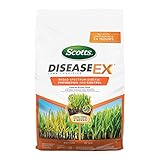 Top
Top Top
Top | Scotts DiseaseEx Lawn Fungicide | Check On Amazon |
 Top
Top Top
Top | Jacks Classic 20-20-20 All Purpose Fertilizer | Check On Amazon |
 Top
Top Top
Top | 30,000 Seeds Pollinator Attracting Wildflower Mixture | Check On Amazon |
 Top
Top Top
Top | Survival Vegetable Seeds Garden Kit-Over 16,000 Seeds | Check On Amazon |
How often to fertilize Hens and Chicks?
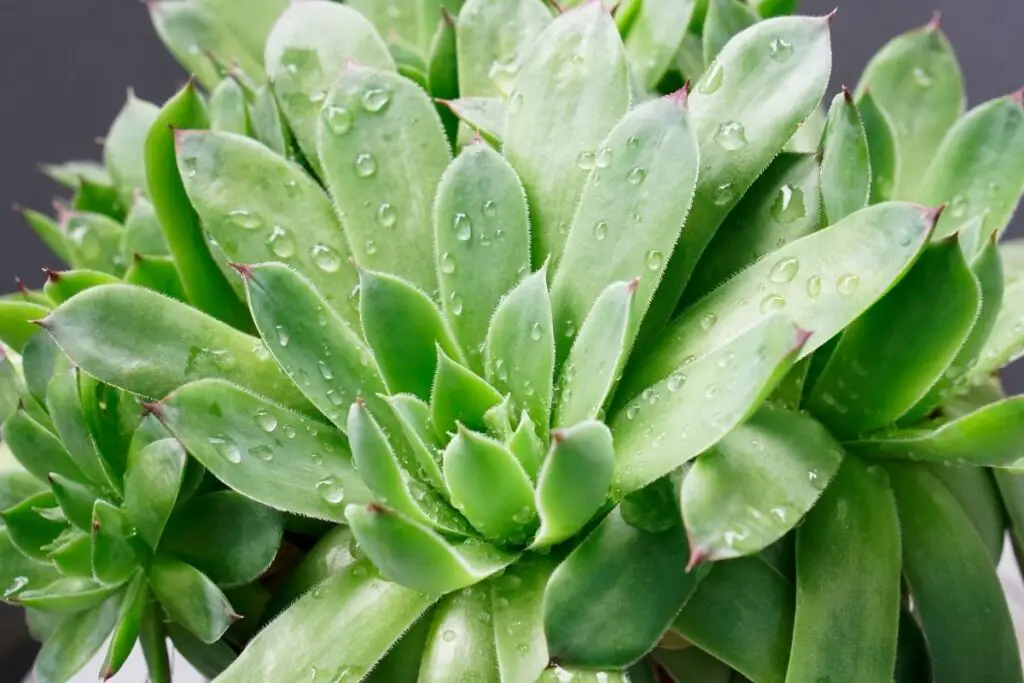
In the previous point, I have mentioned once that the fertilizing frequency depends on the fertilizer concentration, the type of plant, and the plant’s growing condition.
More or less, all the Hens and Chicks will survive when fertilized once a year in the spring. This is because these plants can even thrive in poor soil.
If your plant is sitting in the same place for years without any toppings, you can give them nutrients once a year in spring. This will increase their growth and their ability to multiply and flower.
If your plant is growing too well and you want it to grow more and reach its full potential, you can fertilize them only once a month during the whole spring and summer. As they are doing too well, they can take up the nutrients easily without doing any harm.
For fertilizing once a month, you need to dilute the fertilizer very well, even if it is mild. This diluted fertilizer will ensure not to burn the plant.
What is the best fertilizer for Hens and Chicks?
These plants don’t require much fertilizer. You can even skip the monthly or yearly fertilizing about which I mentioned.
Still, your plant will remain healthy. But yes, they might not grow or multiply faster. Other than that, your plant will be thriving without any nutrients.
If you want to fertilize them, the best fertilizer would be a low-balanced, water-soluble fertilizer. A low-balanced fertilizer is a mild one and has low concentrations. A mild fertilizer will have a shallow risk of salt burns.
Additionally, when you dilute this mild fertilizer, there will be more low risks of burning.
Choose a fertilizer having a nitrogen content of less than 12. A balanced fertilizer having an NPK value of 20:20:20 or 10:10:10 will be ideal for fertilizing the Hens and Chicks. Even if it is mild, dilute it with water at the strength of ½.
You can also fertilize by using only 2 to 3 pellets under one mother plant. Water very well to let it spread evenly.
In the case of pellets, do this if you want to fertilize once a year. This will take more time to dissolve than the water-soluble ones and will work well during spring and summer.
Water the soil bed well before and after fertilizing. Don’t fertilize in dry soil as that will burn the roots. Watering after fertilizing will help in the even distribution of the food.
Some of my top picks of fertilizers are:
- Jacks Classic 20-20-20 All Purpose Fertilizer
- Triple 10 All Purpose Liquid Fertilizer 10-10-10
- Espoma Company Organic Indoor Plant Food
What are NPK values?
I have mentioned that a balanced fertilizer with NPK value 20:20:20 or 10:10:10 is suitable for Hens and Chicks. Now, what is NPK?
NPK stands for Nitrogen (N), Phosphorus (P), and Potassium (K). These 3 nutrients are the main macronutrients that every plant needs for healthy growth.
When I say that fertilizer has an NPK value of 10:10:10, it carries 10% nitrogen, 10% phosphorus, and 10% potassium. These are important because:
- Nitrogen helps in increased metabolism and good photosynthesis.
- Phosphorus promotes flower growth, better root development.
- Potassium helps in boosting the immune system of plants and resists diseases.
How to fertilize Hens and Chicks?
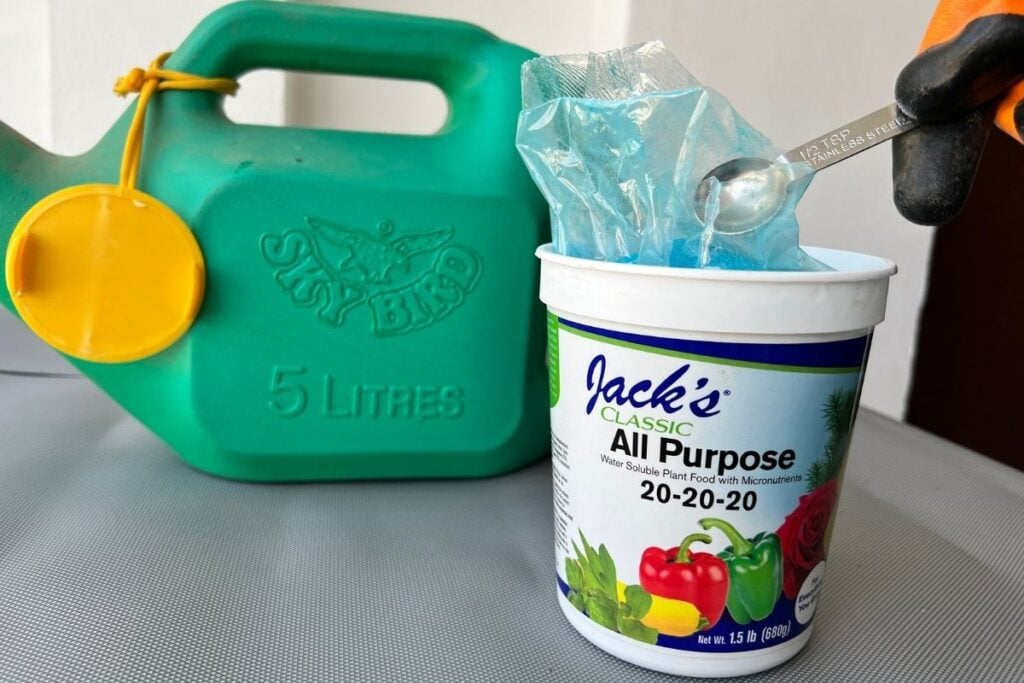
Hens and Chicks are perennials, and they will grow wonderfully with or without fertilizer.
However, experienced growers like fertilizing them to multiply and produce more daughter plants.
Fertilize the Hens and Chicks once a month in spring and summer or once a year in the growing season. The frequency also depends on the plant’s growing condition.
For using a water-soluble fertilizer:
- Saturate the bed to make it moist.
- Dilute ½ tablespoon of the fertilizer with 1 gallon of water.
- Mix well in the watering can.
- Apply it to the bed. Avoid spilling on the leaves.
- Use it once a month in spring and summer, depending on the plant’s condition.
For using pellets:
- Take only 2 to 3 pellets and keep them under one mother plant.
- Water thoroughly to let it spread evenly.
- Use it once a year in the growing season.
Things to keep in mind while fertilizing Hens and Chicks
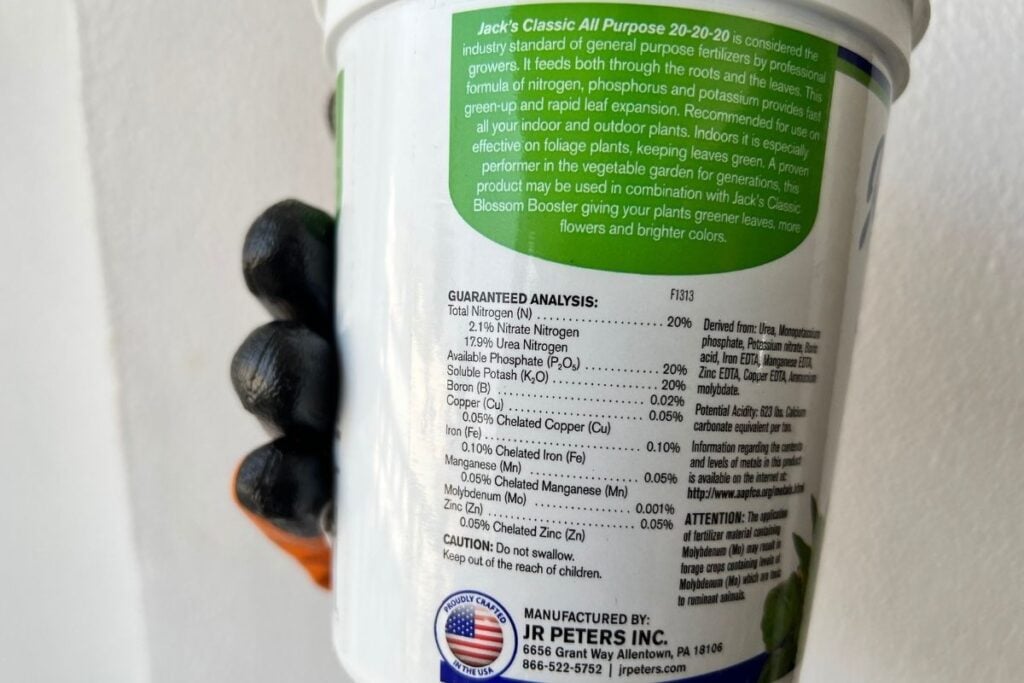
While you fertilize the Hens and Chicks, you need to keep certain things in mind to avoid any other serious issues:
Use a balanced fertilizer
Using a balanced fertilizer will not hurt your plant. Some fertilizers have only high nitrogen or phosphorus. The powerful presence of any particular nutrient will not do anything useful in the plant.
Instead of doing any good, it may affect their average growth and development.
Use a fertilizer that goes low in Nitrogen
Excessive nitrogen is not something to be needed by the Hens and Chicks. High nitrogen content will weaken the plant’s tissues, making it soft and sensitive to rotting.
Use fertilizer specifically for succulents
Other than water-soluble, you can use a balanced slow-release fertilizer favorable only for succulents. As the Hens and Chicks are a kind of succulents, a succulent-based fertilizer will not spoil them.
Moreover, there are very few chances of getting scorched. Because it is a slow-release, the nutrients will be slowly absorbed by the plant as per their need. Applying once a year will be enough.
Always dilute the fertilizer
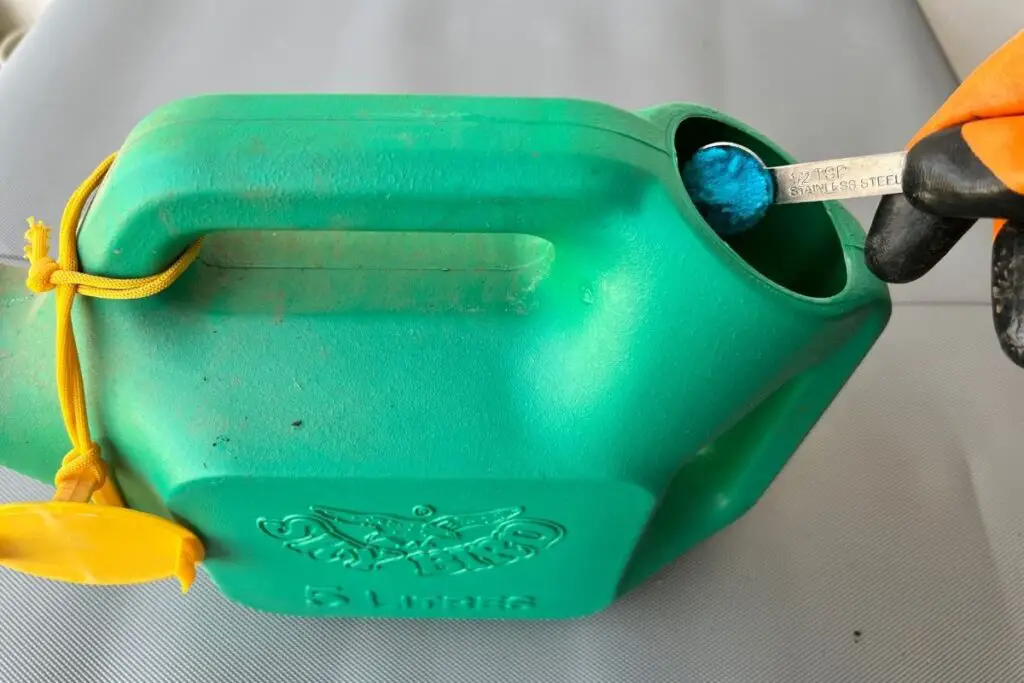
If you are using a low-balanced mild water-soluble fertilizer, you need to dilute the fertilizer with water before applying it. This will reduce the concentration of fertilizer and the risks of burns too.
Generally, only 1 tablespoon is added. But to make the strength ½, add only ½ tablespoon of the water-soluble fertilizer with 1 gallon of water.
Add water
Never fertilize in dry soil. Applying fertilizer directly to dry soil can scorch the roots. Always saturate the soil a bit. This will help in diluting the fertilizer a little more.
The less the concentration, the fewer chances of burns.
After applying a slow-release or pellet fertilizer, you can water the soil bed thoroughly to distribute the nutrients.
Fertilize only during the growing season
Spring is the plant’s growing season. So fertilize during the spring. You can fertilize in summers as these plants bloom in summer.
Fertilizing at these seasons will help them grow faster, spread to create more daughters, and bloom ideally.
Immediately stop at the beginning of autumn because the temperature will start dropping. When the climate gets cold, the plant slowly stops its growth.
They are in no position to uptake any fertilizer or water. Don’t fertilize in winters.
Use fertilizer carefully
Don’t be in a rush while fertilizing. Be in once a month or a year, be very careful while applying. Avoid using more amounts. Check the measurement twice before applying it.
Adding more fertilizer can be toxic to the plants, root burn being the primary problem.
For pellets, use only 2 to 3, not more than that. For water-soluble fertilizer, mix only ½ tablespoon fertilizer with 1-gallon water. Don’t overdo it.
Over-fertilizing Hens and Chicks
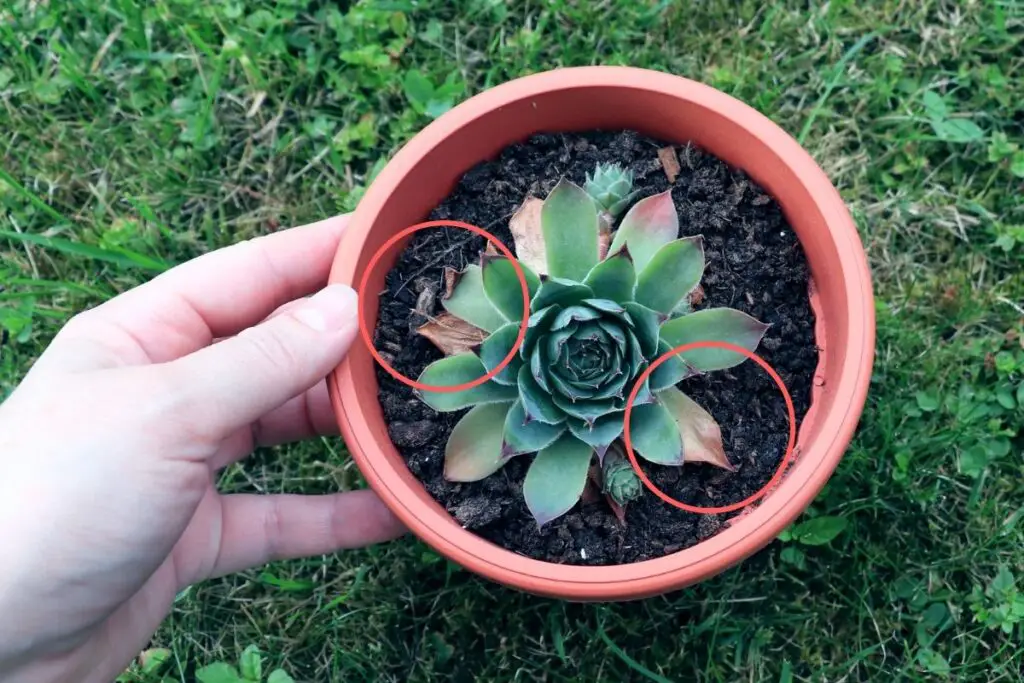
Over-fertilization is something that will not let the plant grow healthfully.
Generally, they don’t need much fertilizer. We only add fertilizer to enjoy their growth more quickly. Excess fertilization will show opposite reactions in the plant, including the death of the plant in severe conditions.
Over-fertilization can cause a lot of problems in the Hens and Chicks:
- It will make the plant elongated and unappealing.
- The leaves will lose their color.
- The plant will become unhealthy. Thus there will be stunted growth and no flowering.
- It can trigger root rot.
- Using excess pellets will make the plant wild and stretchy.
- The best way to avoid over-fertilization is prevention. If you are a beginner in growing Hens and Chicks, avoid using it. There is no problem if you don’t fertilize them.
If you want to use it, use it in the way I have explained in this article in the early titles.
If you are unsure about using it once a month, do it once a year in the spring. That will be enough to help the plants grow faster, bigger, and flower well.
Final words
These plants don’t need any fertilizers. They release chemicals called auxins that nurture their growth. They don’t need extra nutrients. They will flourish when planted in infertile soil.
However, if you want to fertilize, you can do it during their growing season, which is spring. If you are an experienced grower, carefully fertilize them once a month in spring and summer.
If you are a novice, fertilize once a year during spring. If you are in doubt, don’t fertilize. It won’t be a problem. Be careful while fertilizing. Keep fertilization at bay when the temperature gets cold and winter arrives.
Reference: Wikipedia, Iowa State University of Science and Technology, The University of Arkansas Division of Agriculture, NSDU, The Ohio State University, Missouri Botanical Garden.
